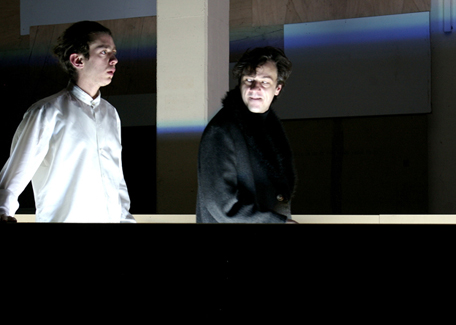DIRECTOR
> THEATRE | MUSICAL THEATRE | OPERA | SPECIAL PROJECTS
Los Mansos
(2005)
The story of my family is one of the mains subjects of this show. And biography (mine and the actors’) is the invisible thread that connects the beads. So, then, Los Mansos.
The story of my family
My family (from my mother side) left Russia in 1941, they left their homeland leaving behind their story. My family follows the German front, leaving Russia, hating Russia; they live for five years in Stuttgart and my mother kept (even today, of course) the happiest memories of her childhood from that place (during my childhood I heard my mother speak of a lost paradise which name was too difficult to repeat for an Argentinean child).
After those five years in Stuttgart they lived in Heidelberg, and then in France, here and there: looking for a lost relative, they walk the world to find him: the son of my grandmother’s sister had abandoned the front and flied away.
My grandmother received good news: her nephew is alive, yes, in South America: they finally left Europe in 1949 and arrive to Buenos Aires in 1950: still seeking him.
One day my grandmother found him by chance in a street of Buenos Aires (two years after she arrived and when the certainty of losing him had settled for ever.)
The whole history of my family changed at that moment: they managed to leave their homeland in order to face a huge challenge that seemed lost forever, but that unexpected encounter rearrange the past and the present.
The liaison to their lost land was reborn.
They decide to forget that they were living in a remote South American country: living since then in a non-existing land: a place built up by their memories and where Russian seems to be the only language. They rebuild Russia in Buenos Aires. They open the doors to others in exile. And in one of those meetings my mother met my father (an Armenian son, too.)
My father was born in Buenos Aires and did not know a word of Russian and only a couple of words in Armenian. But they fell in love and got married.
My mother since then kept her language and history locked: shared with anyone. Time passed by and I was born.
I did not inherit the language.
My mother spoke only Spanish to me; she closed the doors of her past. But my grandparents' house was full of those forgotten scents. Dostoevsky was part of that inheritance.
My grandfather (my mother's father) died first, then my father and a year ago, my grandmother.
I reopen those doors now and - assisted by the stories my grandmother had the wisdom to narrate to me six months before her death – I build up this work.
These are some of the things that structure Los Mansos.Others are: the double or the mirror, a bottle of vodka, a lost language, some labyrinths of the memory and a pocket full of sweets, the War, Russia and then Germany and then Argentina and Germany again and - as there is no more Russia today -: the construction of Russia, my demons, an "I" talking to another "I", some ideas giving birth to some bodies, a tree of voices, a story about Christ that was never told before, a house in Argentina and a Russian soup made with some red beans.
Alejandro Tantanian
-
Los Mansos (The Meek Ones)
by Alejandro Tantanian on motifs from Fedor Dostoevsky’s The idiot. -
with
then María Inés Sancerni
Nastasia Filipovna Barashkov
Stella Galazzi
then Mirta Bogdasarian -
Lev Nikolaievitch Myshkin, Prince
Nahuel Pérez Biscayart -
Parfion Semionovitch Rogojin, Nastasia Filipovna’s suitor
then Ciro Zorzoli
Luciano Suardi -
Press
Simkin & Franco -
Graphic design
Gonzalo Martínez -
Photos
Ernesto Donegana -
Production and direction assistant
Martín Tufró -
Lights
Jorge Pastorino -
Set & costumes
Oria Puppo -
Text, musicalization and direction
Alejandro Tantanian -
Siemens Arts Program, Germany, supported Los Mansos
Running time: 80 minutes
-
Premiere: August 7th, 2005, Teatro Camarín de las Musas, Buenos Aires, Argentina
-
Further presentations:
Seasons 2006 and 2007 at the same venue. -
International presentations:
2007: Festival Riocena Contemporánea, Rio de Janeiro, Brazil
2008: Festival Theaterformen, Braunschweig, Germany

Photos: Ernesto Donegana
-
Nominee in eight categories for the Teatro del Mundo Awards (Edition 2005) and in four categories to the Trinidad Guevara Awards (Edition 2005) including: Best Play, Best Leading Actress (Stella Galazzi), Best Leading Actor (Nahuel Pérez Biscayart), Best Stage Design (Oria Puppo) and Best Light Design (Jorge Pastorino).
Winner of the Trinidad Guevara Award for Best Leading Actress (Stella Galazzi)
Winner of the María Guerrero Award: Premio estímulo (Nahuel Pérez Biscayart)
Nominee to the Clarin Awards 2006: Best Leading Actress (María Inés Sancerni)
Second Municipal Theater Award (Trienio 2005-2007)